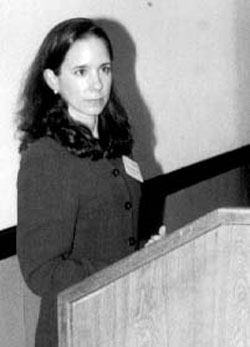Amy Stuart Wells: The Sachs Lecturer on 'Diversity at a Distance'
On October 3, Amy Stuart Wells, spoke to a packed audience in the President's residence in her first of three lectures as the Julius and Rosa Sachs Lecturer and Visiting Associate Professor of Sociology and Education. Professor Wells is on leave from UCLA, where she is an Associate Professor and Head of the Graduate School of Education's Division of Urban Schooling: Curriculum Teaching, Leadership, and Policy.
The lectures are named after the late Professor Julius Sachs, who was appointed as professor of secondary education in 1902 and in 1924, in honor of his 50th wedding anniversary to Rosa Goldman Sachs, endowed a series of lectures by eminent educators.
Stuart Wells received her Ph.D. in Sociology and Education from Teachers College in 1991 and since then her research on detracking in racially mixed schools, charter schools, and desegregation has been widely cited. Among her numerous publications, Stuart Wells is the editor of Multiple Meanings of Charter Schools: Lessons from Ten California Districts (forthcoming, Teachers College Press); co-author with Emeritus Professor Robert L. Crain of Stepping Over the Color Line African-American Students in White Suburban Schools (Yale University Press, 1997); and author of Time to Choose: America at the Crossroads of School Policy (Hill & Wang 1993).
This past April, Stuart Wells was given AERA's Raymond B. Catrell Early Career Award, which recognizes a distinguished program of cumulative educational research within the first decade following receipt of the doctoral degree. At a TC presentation in October of 1999, where she put charter schools under the microscope, Professor Thomas Sobol introduced Stuart Wells as "preeminent among those researchers without bias" and "able to illuminate the questions at the core of the charter school debate better than anyone."
Stuart Wells' first talk was titled "In Search of the Uncommon Schools: Charter School Reform in Historical Perspective." Her next two talks are " Local versus Community Control in Education: Distinctions of Race, Class and Power" and "Lessons from the Free Market Reforms of the 1960s: The Need to Bring Equity Back into Educational Policy Debates".
In an interview before the first lecture, Stuart Wells spoke about how she became involved in educational policies pertaining to the politics of race and culture. "I had always been interested in desegregation and issues around race and education and how that affects who gets what opportunities within the educational system," said Stuart Wells.
Was there something in her own past that might have triggered her interest in race and education in America? "I went to a racially segregated public high school, predominantly white, where there were two black students in my class of 705 in suburban St. Louis?So I think subconsciously, even though I was relatively young, it influenced me," said Stuart Wells.
Stuart Wells started her career as a journalist and did some stringing for the Associated Press. However, she felt frustrated by the limitations of journalism and her inability to dig deeper into a story as well as her desire to put detail into complex stories. Nevertheless, she credits her interviewing as a reporter as a means of reaching a larger audience in her scholarly work. "It's important to write for a scholarly community, where you share ideas, but that isn't enough for me. I also want to be a part of a larger dialogue," said Stuart Wells.
In speaking about her lecture series, Stuart Wells remarked that her main interests had come together in an "interesting way." She explained that many Americans support the public school in theory, as a common school for children with different backgrounds who come together and interact in a public space. Stuart Wells admitted, "My work has shown the tendency has not really been toward the common schools, in large part because of race and also class."
"The tendency," Stuart Wells continued, " has been to create very uncommon schools. And it is only when certain policies that are powerful like court orders and desegregation---or if we could change the charter school laws to enable people to make more racially diverse schools--- it is only then that we could realize that vision of a common school for children."
Stuart Wells clearly asserted that "If we step back and look at the charter school movement, we see a perfect microcosm of the resistance against the myth of the common school."
While in the abstract, Stuart Wells said, almost everyone believes in the common school, her research on tracking revealed that, in truth, the common school exists within a highly stratified segregated society. "One thing I learned in the detracking study was that parents like the schools because they were racially diverse. But at the same time, they wanted separation within, they wanted tracks, they didn't want their kids necessarily in classes with lower-tracked children. So they wanted what I call 'diversity at a distance.'"
Published Wednesday, Jul. 10, 2002
